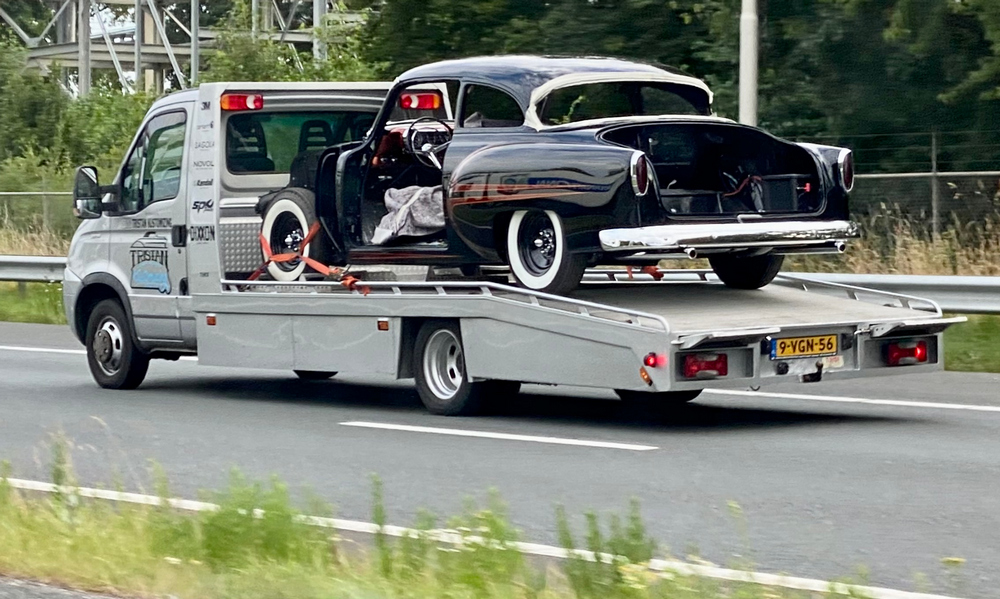This article originally appeared in the February 2024 issue of THE SHOP magazine.
So, it’s time to ship a finished vehicle to a special event or an excited customer. These special deliveries involve more than just loading the car onto a hauler or trailer and driving away.
Read on to learn the top five essentials every professional needs to ship a vehicle to a client or a car show.
- INSURANCE COVERAGE
Car shipping has its share of risks. These include theft, accidents and damage when loading or unloading. That’s why you need to get the right coverage.
To adhere to federal law, you must carry at least $750,000 in primary liability insurance as a car shipper. This covers property damage and bodily injury you cause to other road users.
Other extra coverage options to look at include:
- Cargo insurance
- Physical damage insurance for your truck
- Loading and unloading insurance
- Workers’ compensation
- OPEN OR ENCLOSED AUTO TRANSPORT?
Open carriers expose cars to the weather and road debris during transit, while enclosed carriers provide complete protection.
Open trailers have immense profit potential, however. Most customers prefer open transportation because it is a cheaper option.
Moreover, some open trailers can accommodate up to 10 vehicles, allowing quicker shipping. For shops looking to buy, they’re also relatively affordable to invest in, operate and maintain.
Meanwhile, enclosed trailers usually only carry up to three vehicles. Ideal for transporting fragile or valuable cars, demand for enclosed trailers is lower because they’re more expensive.
In most cases, customers pay up to 50% more for enclosed shipping over open transport.
- THE RIGHT LICENSES & PERMITS
You’ll need the right licensure to legally operate as a car shipper. Here’s a checklist to ensure everything’s covered:
- State-specific auto transport licensing: Each state has its own licensing requirements for car transporters. Visit your state’s Department of Motor Vehicles website to find out what licenses you’ll need.
- Commercial driver’s license (CDL): There are three CDL class categories—Class A, Class B, and Class C. Most car shippers operate with a Class A CDL.
- Federal Motor Carrier Safety Administration (FMCSA): Car shipping companies must register with the FMCSA. The organization monitors and regulates the operations of shipping companies.
- U.S. Department of Transportation (USDOT) number: Every auto shipper needs a USDOT number. Customers can check your background history and compliance using this unique identifier.
- ROUTE PLANNING SOFTWARE
Route planning entails finding the most convenient truck routes. The process helps car shippers save time while reducing fuel expenses, driver wages and truck insurance costs.
Don’t rely on Google Maps as your route planner. It doesn’t show heavy traffic or adverse weather along routes.
Instead, find reliable truck route software that considers all important aspects of route planning, including live location updates, travel speed, road conditions and safety factors.
- A STRONG CUSTOMER SERVICE TEAM
Customers want to feel assured that their cars are in safe hands. Therefore, you need a customer service team that can promptly respond to client queries.
Your customer service team should also give customers regular updates on car shipments.
Find qualified candidates for the role and provide them with the training, knowledge and tools they need to excel at their jobs.
THE BOTTOM LINE
The auto shipping industry can be quite profitable. But, like any other business, you need a robust business plan to make strides.
If you’re not sure where to start, you can use the tips and essentials outlined in this guide to get a foothold in the industry. And, who knows—you might scale up to the point of offering international car shipping services someday.
This article was provided by Jalopnik Advisor, a news and opinion website about cars, the automotive industry, racing, transportation, airplanes, technology, motorcycles and more. Visit jalopnik.com/advisor.
